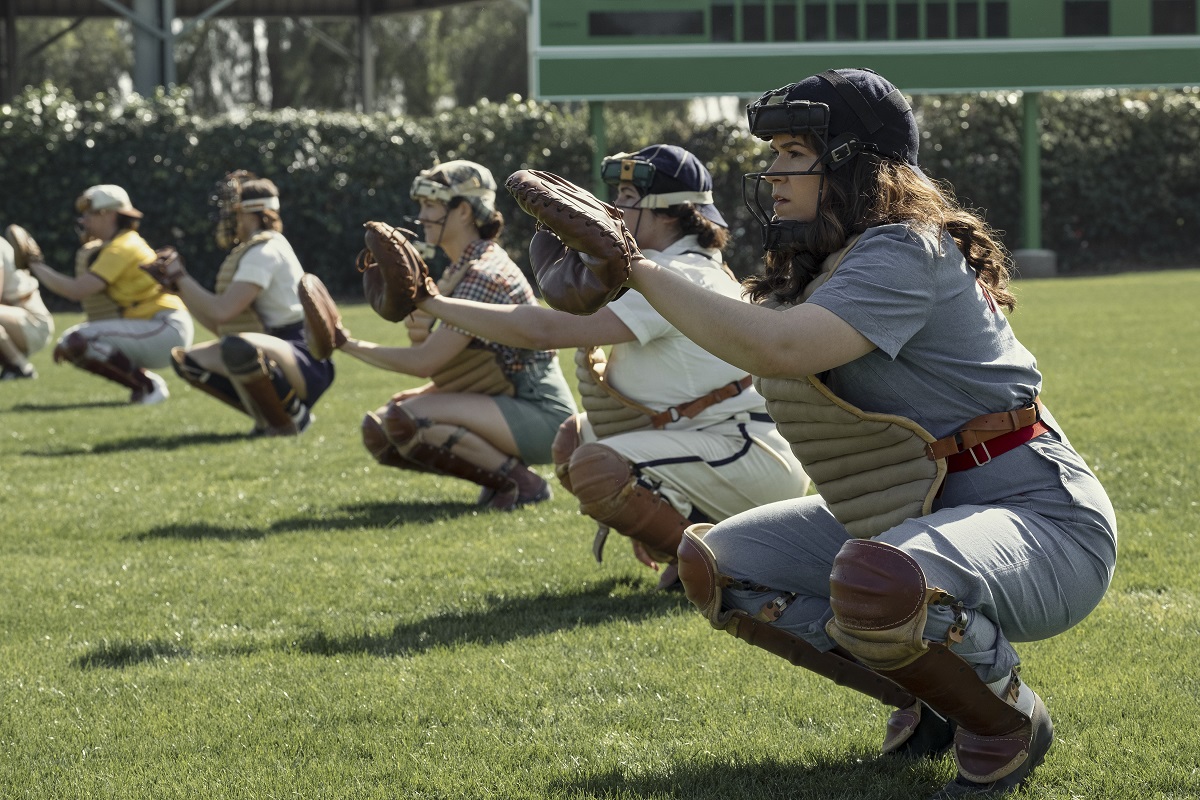Remaking a classic can be hard. Replicating the original magic is not as simple as recombining parts, and the task is often trickier when trying to turn a movie into a TV show; it’s easy for stories to become bloated from all those additional minutes, plotlines, and characters. But Prime Video’s new “A League of Their Own” is a winning remake, one that updates the 30-year-old original in all the right ways while cherishing the favorite touch-points of the original.
Our protagonist is still the catcher, arguably the least lady-like position (which matters in its 1940s setting) with her face hidden behind the mask, body covered in pads, stuck in a squat. Back in 1992, Geena Davis crouched behind the plate as Dottie Hinson. In the eight-part series co-created by Abbi Jacobson and Will Graham, Jacobson plays the lead and renames her Carson Shaw. Carson is different than Dottie in many ways but they both play on the same team—the Peaches—wear the same uniform (the pink and red skirt suit will surely be a favorite for Halloween this year), and have to deal with an absent-to-grumpy manager (although Nick Offerman cannot compete with Tom Hanks’ famous performance).
There are even some of the same scenes—think the untidy ballplayers undergoing makeovers to better attract their perceived male fans. With their make-up on and hair done, they appeal better to the male gaze if uneasily and only for a time. And while the original rejected this ideal as sexist, the new version goes further in critiquing the systems our ballplayers find themselves in and is much more satisfying as a result.

As the series goes on, the warm and comforting notes pulled from the original mostly fade away as this version of the Peaches becomes real and their concerns pressing (although a late-season utterance of “there’s no crying in baseball” momentarily brings them back). The show pulls off this trick in part by making the baseball itself compelling—the familiar sports arc of an underdog team beating expectations is as satisfying as ever. And without spoiling it, let’s just say the final at-bat is a perfect conclusion to the eight or so hours before it.
So yes, “A League of Their Own” works as a plot-driven baseball story but it gets really interesting in how it addresses so many of the problems of the original. For one, Jacobson and Graham add a Black baseball player Max Chapman (played masterfully by Chanté Adams), who the league’s owners deny the opportunity to try out because of her race. Now, one Black character tacked on could do more harm than good, especially if she’s overly simplistic or used to make the white characters feel or look better.

Thankfully, Max has her own complete world outside of the Peaches, populated with complex, compelling Black characters. Their differences and numbers defy stereotypes, particularly in how the show portrays Max’s relationships with the women in her life, like her best friend Clance Morgan (the effervescent Gbemisola Ikumelo) and mother Toni (the formidable Saidah Arrika Ekulona). Max’s plotline is also interesting when the Peaches and the two interact. The show is careful not to let Shaw, in particular, off the hook for her complicity in a racist system that benefits her.
Further complicating the show’s racial politics, the Peaches have two Latinas on the team: pitcher Lupe Garcia (Roberta Colindrez) and Esti González (Priscilla Delgado). As fair-skinned women, they have much more freedom and privileges than Max and her Black counterparts, but still find themselves stuck in a racist system.
It’s all very smart and well done, and then Jacobson and Graham lay in their biggest update to the original: unapologetically highlighting lesbian stories. 1992’s “A League of Their Own” hinted at lesbian sexuality but the film’s top takeaway on the matter was “playing baseball as a woman doesn’t make you gay.” Here the message is more “there’s nothing wrong with being gay and the laws, structures, and culture that say otherwise are monstrous.”
In this version, we have gay romances to root for with sexy scenes, gay joy, and full, gay personhood. There’s also an examination of the laws and isolation LGBTQ people faced in the 1940s, including a scene depicting state violence. The networks of support—from friends to family members to underground safe spaces—are more nuanced than typically portrayed, and while bigots certainly exist in this fictional world, they are largely given the chance to grow and learn.
The result is a show that is more fun than the original. This “A League of Their Own” is able to explore and laugh with more of its characters, find their depth, celebrate their new-found freedoms, and cast an unflinching gaze on the ways their society still held them back—not just as women, but also as lesbian or bi people, Black women, and Latinas. As such, the 2022 “A League of Their Own” is so much better at telling the tale of this moment in women’s history, finding the real joy that only comes when not shying away from injustice.
Whole season screened for review. Premieres Friday, August 12th.












